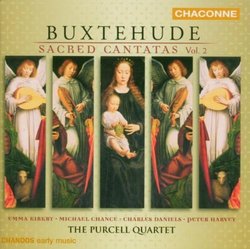| All Artists: Dietrich Buxtehude, Michael Chance, Purcell String Quartet, Purcell Quartet, Emma Kirkby, Charles Daniels Title: Buxtehude: Sacred Cantatas, Vol 2 /Purcell Quartet Members Wishing: 0 Total Copies: 0 Label: CHANDOS CHACONNE Original Release Date: 1/1/2005 Re-Release Date: 9/20/2005 Genres: Pop, Classical Styles: Vocal Pop, Opera & Classical Vocal, Historical Periods, Baroque (c.1600-1750) Number of Discs: 1 SwapaCD Credits: 1 UPCs: 095115072325, 095115072325 |
Search - Dietrich Buxtehude, Michael Chance, Purcell String Quartet :: Buxtehude: Sacred Cantatas, Vol 2 /Purcell Quartet
 | Dietrich Buxtehude, Michael Chance, Purcell String Quartet Buxtehude: Sacred Cantatas, Vol 2 /Purcell Quartet Genres: Pop, Classical |
Larger Image |
CD Details |
CD ReviewsA voice teacher early music fan George Peabody | Planet Earth | 12/20/2005 (5 out of 5 stars) "TOP OF THE LINE BRITISH SOLOISTS SKILLFULLY PERFORM SOME VERY LUSH BUXTEHUDE! Dietrich Buxtehude (1637-1707) was one of the three major North German composers of his era. He was also one of the most prolific composers of his time, his scope including liturgical music, cantatas and oratorical works for services and concerts, solos arias and cantatas, organ preludes, fugues, toccatas, chorale variations and fantasias , and chamber music including nineteen keyboard suites. Moreover, judging from features common in both, Buxtehude's cantata 'Jesu, meine Freude' may well have served as Bach's model for his five-part motet on the same chorale (BWV227). Though it is arguable that Buxtehude was Bach's greatest precursor, it would be foolish to think of his vast output merely as a preparation for Bach. Buxtehude's music deserves to stand at the summit of his age in its own right. Although Buxtehude was primarily an organist, he was required as part of his church jobs to not only direct the choir occasonally but also to write some choral selections. Most of these comprised small-scale pieces such as those recorded here. It is quite possible that these pieces may have been performed during services by a chamber ensemble located in the organ loft. The prefered musical genre for private devotion at these small-scale gatherings was the strophic aria for solo voice and continuo. I found them to be very attractive and certainly well sung by the soloists, all of whom are excellent singers and obviously very skilled in the Early Music area. And, of course, the Purcell Quartet is unmatched in their ability to weave in and out of the vocal line in an exemplary fashion! I especially liked the first cantata:"Das neugebor'ne Kindelein" (Newborn today this little child) which features all 4 soloists:Kirby(sop)-Chance(countertenor)-Daniels(tenor) and Harvey(bass). And also the final cantata"Jesu dulcis memoria" (the thought of Jesus, sweet and kind) which features Chance and Harvey. It's all great music and played marvelously!!!!" Don't Use Cumin in Desserts! Giordano Bruno | Wherever I am, I am. | 01/29/2009 (3 out of 5 stars) "One of my loving Swedish aunts gave me an elegant wall-hanging for my wedding years ago, an embroidered spice chart showing the uses of cardamon, allspice, cinnamon, cumin -- all the Swedish delights. After staring at the chart dozens of times, I found I could summarize it in one kitchen rubric: don't use cumin in desserts.
My somewhat oblique point is that some combinations don't work. Musically, some ensembles don't come together, at least not always. I hate to contradict "Ariel" about vocal technique -- he is a voice teacher -- but to my ears this performance of wonderful music by a great composer sounds like strawberry shortcake with cumin. The problem is the utter lack of blending between soprano Emma Kirkby and alto Michael Chance. Both of them are 'immortals' of the Early Music world, and I'm sure they've sung together often over the years, but on this CD from 2005 they seem hardly to notice each other. Ms. Kirkby's voice has lost some of its springtide loveliness yet it still pleases; however, she has begun to sing consistently just at the lower threshold of absolute pitch -- not out of tune, certainly, but bringing a certain 'color' to her consort work. Mr. Chance's voice has always had something of a hollow tubular quality, an 'alpenhorn' forthrightness that critics of counter-tenor singing have called "hooty." In this performance, his style and his unsupple timbre combine to dominate the ensemble in a way that I hear as disruptive. The two lower voices are shadowed, and the whole quartet lacks integration. There are excellent tracks on this CD, but as a whole I can't recommend it strongly. On the other hand, the earlier volume 1 of Buxtehude's Sacred Cantatas, also with Emma Kirkby, is superlative." |
